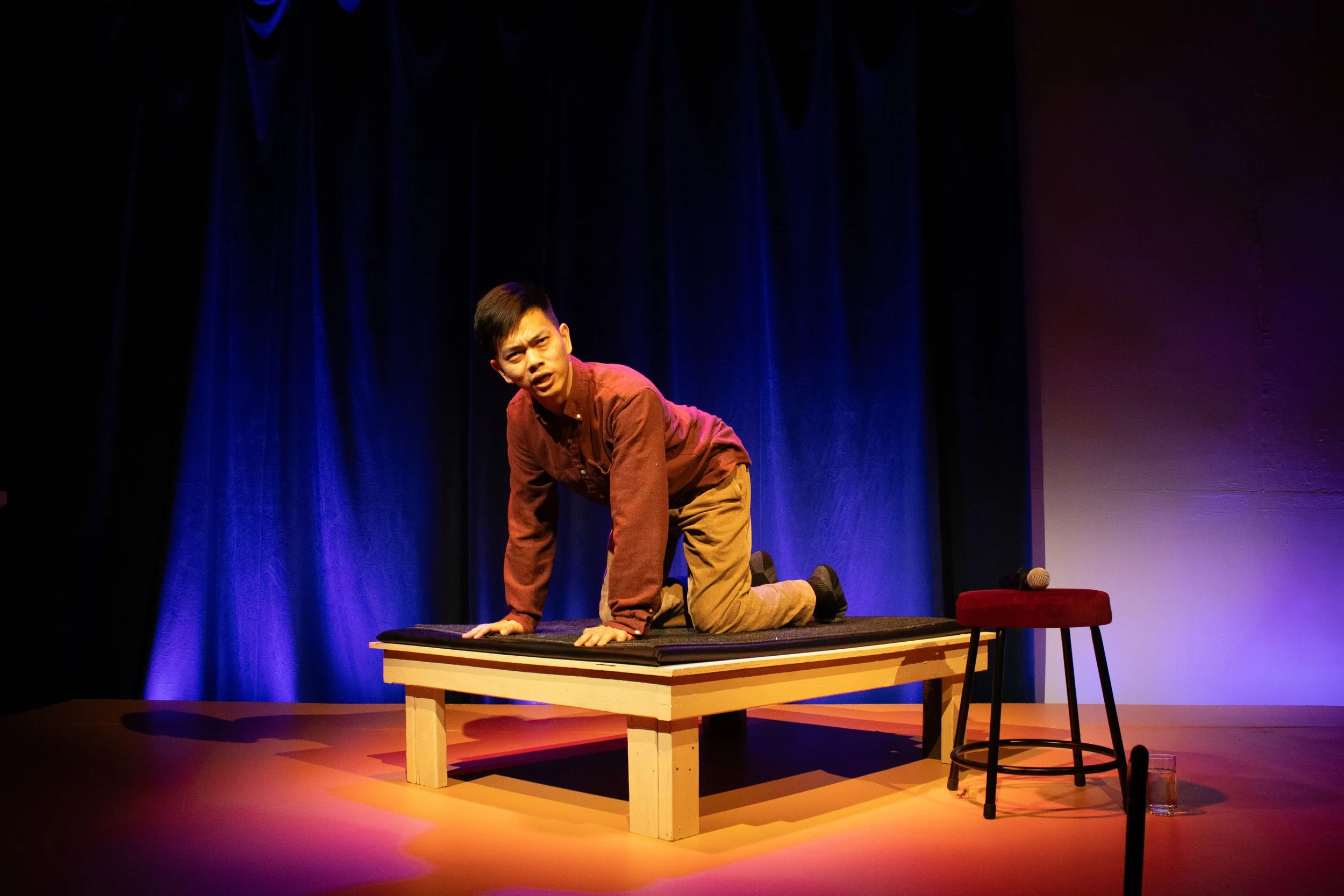Aaron Pang proves that truth is sexier than tropes
Haneul Lee responds to Falling: A Disabled Love Story by Aaron Pang, exploring the mainstream media’s obsession with disabled bodies and why disabled people get to be seen as “cute” but rarely “sexy.”
To reconcile with water, through fear and grief
Elete N-F responds to How I Learned to Swim by Somebody Jones, embracing the darkness of water and its properties of healing and communality.
Excavating childhood from the chaos of conflict
Anthony V. Capildeo responds to Precious Cargo, a story about the children affected by Operation Babylift during the Vietnam war, by Australian writer-performer Barton Williams (Huynh van Cuong) and Hebridean composer Andy Yearley (Nguyen Tang).
Longing for a child and waiting for a moment
In this Response to Rat Tails (WIP) by Jeremy McClain, Eilidh Akilade details the journey of art criticism, from the inception of an idea in June, to the witnessing of an Edinburgh Fringe show, before the long bus ride home in August.
History repeats itself at the Edinburgh Fringe
Katie Goh responds to A History of Fortune Cookies by Sean Wai Keung, looking back on previous iterations of the performer’s work and of her own writing to find value in repetition.
Charlene Kaye: A Rockstar breaking generational moulds
Xandra Sunglim Burns responds to Charlene Kaye’s show ‘Tiger Daughter or: How I Brought My Immigrant Mother Ultimate Shame’, on music, mothers, and breaking the generational curse of assimilation and propriety.
Finding poetry below the surface
Theophina Gabriel responds to Alexandrina Hemsley’s Fountain, where a trio of dancers explore tidal cycles of repair, loss, joy and intimacy, expressed through movement and digital imagery.
Smitten for a rom-com’s quest for connection
Xandra Sunglim Burns responds to The Perfect Knight, a film by Stephané Alexandre that shows romance may come when you are least expecting it.
Moving through manipulated pasts
Shirine Shah responds to Flesh and Paper (1990), a lyrical exploration of the sense and sensibilities of Indian lesbian poet and writer, Suniti Namjoshi, directed by Pratibha Parmar.
Speaking back to silence
Deborah Chu responds to Mourad Kourbaj’s striking tale of a family escaping the horrors of the Argentine dictatorship and 'La Junta Militar' in Una Muerte y Un Nacimiento//A Death and A Birth.
The taste of a mother tongue
Nasim Rebecca Asl responds to Violeta & Sofia, a film by Noah Berhitu and Alejandra Rogghé Pérez on the power of food to maintain generational links to culture and place after migration.
When love sits between us
Vrinda Jagota
Mohammedally Shushtari’s film Can Be beautifully shows all of the emotional complexities of two siblings, a brother and sister, Noura and Faiz, grappling with their father’s death. Each embodies conflicting emotional responses, clearly feeling misunderstood by the other. But, as each character learns to accept the other’s feelings, they map a path towards not only empathy for their sibling, but also a more holistic healing experience for themselves.
Home is the horizon
Hayley Wu (胡禧怡)
“It feels like there’s no good place to be these days,” my friend tells me over lunch. We are in a quiet corner of Hong Kong, thinking about the dozens of friends and acquaintances who in the past year have left the city, looking for a new home. From what we hear, no one has found one elsewhere yet.
Finding sacrality in the city
Radha Patel
The opening scene of Cecilia Lim’s audiovisual poem, Pagpapa(-)alam: To Wish You Well, So You Know shows a care worker helping their elderly patient walk down a street. It is an image that feels hopeful; the future reflected in the present. Tenderly shot in Queens, New York, and captioned in three languages, Tagalog, Spanish and Bangla, the three and a half minutes that follow juxtaposes images of women from these communities cooking, caring and praying for each other.
Communing with our ancestors to sever the past
Memuna Konteh
Journeying through dense forest into open fields, Mojereoma Ajayi-Egunjobi calls on Omolore, her mother’s mother who she never knew. She does not need a conversation partner, but a witness, an accomplice on a path paved with pain and promising freedom. Dear Omolore is testament to the power of poetry and film to distil otherwise indigestible emotions.
The space of grief between us
Ojo Taiye
I was a thirsty traveller in the bustling city of Benin, Nigeria, when I was sent Back on Home Soil to watch. At first, unable to wait, I skipped through the reel, and then finally home, sitting in my parlour after dinner, I settled to watch it.
May death lead us home
Memuna Konteh
Michael Jenkins’s short film, Pickney, is a haunting yet uplifting story about the unifying power of grief and the complexities of mixed-race identity. It follows teenager Leon, a mixed-race Bristolian with few ties to his Caribbean heritage outside of a close relationship with his nan, Pam, the mother of his estranged father, David.
Finding comfort and kinship in our ancestors
Hayley Wu (胡禧怡) responds to Thulani Rachia’s ixwa blue, a film that traces several colonial architectural sites in Cachoeira Brazil, investigating Rachia’s paternal line of ancestry. A Fringe of Colour 2021 commission.
Depicting Black girlhood and hair politics through classroom friendships
Memuna Konteh responds to Blue Corridor 15 – Dubheasa Lanipekun’s candid short film about three Black girls navigating the complex and hostile environment that is secondary school.
A beginner’s guide to Bristol’s gentrification problem
Elete N-F responds to Clifford, a comedy short by Corinne Walker with a 70-year old Jamaican protagonist navigating life in a house-share in Bristol.




















